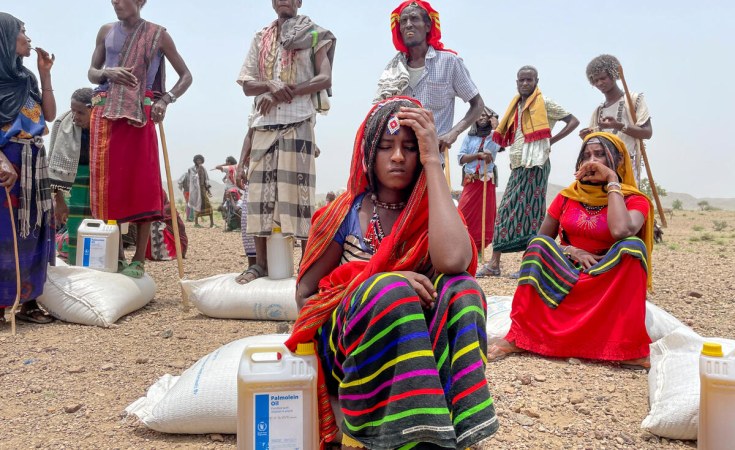One year after the end of Ethiopia's Tigray conflict, complete peace remains elusive and the humanitarian crisis remains. Critics accuse the government of not keeping its promises.
Before the outbreak of the war between the Ethiopian National Defense Forces (FDRE) and the Tigray People's Liberation Front (TPLF) three years ago, 25-year-old Haftom Kidai had no military experience, never carried a gun, and was engaged in private business.
"When the war started, Ethiopian and Eritrean forces entered Tigray and started to commit atrocities. I then took military training and joined the fight like the other young people of Tigray," Haftom told DW.
Haftom was severely injured at the battlefront. Now, half of his body is paralyzed and he lives in an army care center in Tigray's capital city, Mekelle.
No proper treatment for veterans
Despite all his suffering, the young man does not hold grudges. "I joined the struggle for my country, for my people and myself. I don't regret the sacrifices I made. I did what I had to do," Haftom said.
"But now, all of us here, including myself, have become disabled. We have a lot of demands and needs." Most importantly, Haftom desires treatment. "If I get proper treatment, I don't want anything else."
Many Ethiopians suffered huge losses during the brutal war that began in November 2020. It lasted for two years and killed an estimated 600,000 people, according to former Nigerian President Olusegun Obasanjo, the lead peace mediator during the conflict. Many more were injured. In addition, the UN estimates that the fighting displaced nearly 1.7 million people and caused physical and psychological damage to millions of Tigrayans like Haftom.
Negotiations with both fighting parties were mediated by the African Union (AU) in Pretoria when the regional forces from Tigray and the Ethiopian government, on November 3, 2022, signed an agreement on a "permanent cessation of hostilities." Finally, the peace agreement ended the civil war in Ethiopia.
Mekelle gradually returns to life
After the peace deal, not only did the sound of gunfire stop, but the government also lifted the siege that was imposed on Tigray.
Telephone, internet, transportation, commercial activity, and humanitarian aid supplies, which had been suspended for two years, resumed after the signing of the peace accord.
Slowly, Tigray's capital, Mekelle, came back to life after the end of the war. The residents of the city also seem to be enjoying the peace. Bilen Mitiku, a resident, told DW that "being able not to hear the sounds of gunfire, aircraft's or drones has been a blessing."
According to Mitiku, after the peace deal, Tigray seems to be more open to the world in terms of communication and transportation. "We have rejoined the rest of the world after three years of being in the dark," Mitiku said.
Humanitarian needs are still a challenge
However, one year after the peace agreement, there are still many troubling things, Mitiku stressed. "A lot remains unchanged, a lot remains in the dark, most importantly, our internally displaced brothers and sisters. They have been away from their home close to four years now."
International aid organizations are still struggling to assist people in need. Drought, cholera and malaria outbreaks -- not to mention the plague of locusts -- caused more harm and aggravated the dire situation.
According to the Office for the Coordination of Humanitarian Affairs (OCHA), the humanitarian situation remains critical. Over 1 million people are estimated to have been internally displaced and 1.5 million may require food assistance.
In addition, the UN has warned of ongoing atrocities, including war crimes and crimes against humanity.
Daniel Semungus, a lecturer at Mekelle University, told DW that the first anniversary of the Pretoria agreement has led to unique and mixed feelings among the people of Tigray.
"The suffering of internal displaced people continues to affect us all," Semungus said, adding that some progress had been made. "Communication, the internet is restored. Kids are going to school, people can access health care facilities and there has been a resumption of all forms of transportation."
Despite this, many people in Tigray continue to demand the full implementation of the peace agreement signed a year ago.
The conflict displaced Hagos Tesfay, who now lives in Tigray's Irob district, that borders Eritrea. His community is under the control of the Eritrean army, he told DW.
"Since the signing of the peace agreement services such as banks, telecoms, and electricity, which were closed in most areas of Tigray, have been opened. But in Erob district, nothing has changed. Most of the Erob district are still controlled by the Eritrean army," Hagos said.
Peace deal not fully implemented
Gebreselassie Kidane was displaced from the Western Tigray zone, an area that is now under the control of Amhara militants. "Three years ago, when the war started, we got out of our homes and saved our lives, but our life here is difficult. There are no basic services. There is no help," Kidane said.
He told DW that even after the war had stopped, they could not return to their homes.
The Alliance of Civil Society Organizations of Tigray (ACSOT) claims that the peace agreement signed a year ago has not been fully implemented. "The federal government is not doing enough to keep its promises," Yared Berha, head of Tigrayan Civic Society, told DW.
Redaei Halefom, head of communications at Tigray's interim administration, urged the government to take responsibility for the withdrawal of the foreign forces in Tigray and the immediate return of the citizens displaced due to the war. "We expect the federal government to get all militants out of the Ethiopian Defense Forces in Tigray," Redaei said. He insisted that according to the agreement, Amhara militants and Eritrean soldiers should leave Tigray.
Edited by: Chrispin Mwakideu


